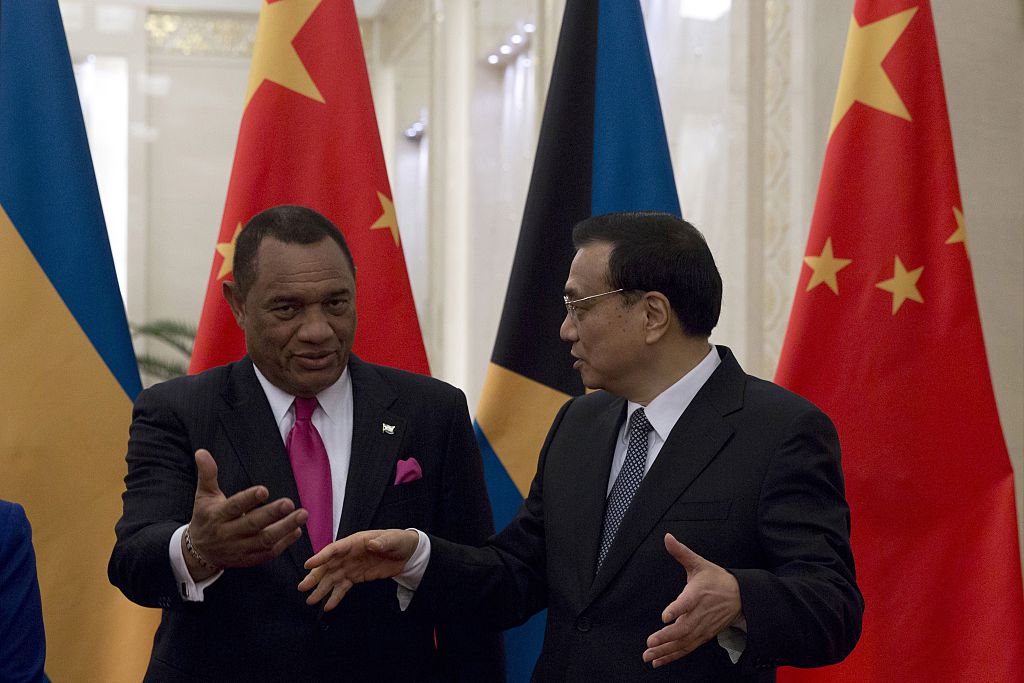Bahamas Then-Prime Minister Perry Gladstone Christie, left, talks with Chinese Premier Li Keqiang at the Great Hall of the People in Beijing in 2015. AFP/GETTY IMAGES
DR. WILLIAM H. GODNICK/PERRY CENTER
Foreign influence in the Bahamas is often seen through a historical lens such as the 1980 Cuban bombing of a Royal Bahamas Defence Force (RBDF) patrol vessel, which was within its territorial waters when it detained Cuban citizens engaged in illegal fishing. Illegal fishing remains a contested issue between the Bahamas and other nations as does illegal migration, another issue reminiscent of 1980 when the Mariel boatlift’s migration of tens of thousands of Cubans to the U.S. overshadowed Cuba’s aggression toward the Bahamas. Today, a new foreign threat is in the Bahamas: the People’s Republic of China (PRC). The PRC has sought to increase its economic, political and, potentially, military power in the Bahamas through its One Belt, One Road (OBOR) initiative and adjacent activities.
The Bahamas personifies the concept of the “third border.” A high-income nation of some 700 islands off the southeastern coast of the United States, the Bahamas has solid institutions despite strong pockets of income inequality. The country is highly susceptible to climate change and natural disasters as was seen in 2019 when Hurricane Dorian hit the archipelago, causing $3.4 billion in damage. Haitian immigrants to the Bahamas are among the most vulnerable to climate-related disasters. Tens of thousands of Haitians have settled in the country in addition to many more who use it as a transit point to the U.S. The Bahamas is also grappling with illegal drug trafficking by transnational criminal organizations and related financial abuses, which the government has taken efforts to address.
The Bahamas is a clear example of how the PRC has been gaining a multidimensional foothold in the region. In recent years, China has helped build a $30 million stadium, provided preferential loans to build a $3 billion mega–port and $54 million to build a four-lane highway and loaned $3 billion to build a new tourist resort. However, not all that glitters is gold, as PRC-connected construction companies in the Bahamas have been accused of faulty workmanship and forcing excessive hiring of Chinese expatriates, according to a February 2016 report by The New York Times newspaper. In some cases, the companies have facilitated the smuggling of Chinese migrants to the U.S. Fortunately for U.S. interests, the Bahamas has not formally signed up to the OBOR initiative nor do PRC investments to date cross the threshold into significant military or security cooperation.
The U.S. political and economic system is not configured to compete directly with the PRC’s infrastructure investments even though there are some positive developments in how both the U.S. Agency for International Development and Development Finance Corp. are seeking to leverage their investments in governance and resilience in the Caribbean. The U.S.Department of Defense has and continues to make important investments in the capacity of the RBDF through the donation of watercraft and communications equipment.
For the immediate and intermediate future, the DOD could develop additional strategies to further strengthen its relationship with the Bahamas. For example, the DOD could create national security waivers for military training and officer education, making Bahamian officers eligible for scholarships at military academies and institutions of professional military education. Currently, Bahamian officers don’t enjoy those benefits due to the country’s status as a high-income nation. PRC educational programs do not have such obstacles. Secondly, the U.S.government could support the Bahamian government in its efforts to join the Budapest Convention on Cyber Crime and to build a path to developing non-PRC-linked 5G technologies. Such steps would facilitate both democratic governance and interoperability with the U.S. and other Western democracies’ defense and law enforcement institutions.
William Godnick is a professor of practice at the William J. Perry Center for Hemispheric Defense Studies at the National Defense University in Washington, D.C. The views expressed here are his own.

